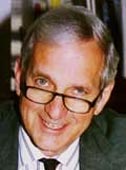Editor's Column

Martin McKneally
|
In his recent Robert Stone
lecture to the Department of
Surgery, the distinguished
research psychologist Anders
Ericsson discussed an interesting
and important aspect of performance
at the expert level. Ericsson's research is the original source of the maxim
popularized by Malcom Gladwell that 10.000 hours of
practice are needed to achieve expertise (see also
Surgical Spotlight Summer 2009). In
addition to deliberate practice,
masters in skilled occupations
have unique cognitive representations
of the tasks they undertake.
World class soccer players that Anders has studied
know where every player is on the field, in the way that
Wayne Gretzky knew where every hockey player was on
the ice. In addition, there is a fourth dimension - the
time dimension, projected forward. Gretzky knew not
just where the puck was going, but where the players
were going as well. Master chess players know what their
opponents will do in response to certain moves, how
they will counter them, and how their counter moves
will change the board. This cognitive representation is
so rich that it allows making predictive judgments many
moves in advance.
Some analysts relate Tirone David's surgical expertise
to his ability to "see surgical problems in three dimensions".
This is an insufficient explanation. Ericsson's
analysis focuses on the fourth dimension, providing a
better insight. At a cognitive level, David sees what is
coming far enough in advance that he anticipates rather
than encounters problems. There is also a fifth dimension
- seeing beyond the present reality to what might be
ideal. That is the creative intuition that leads to advances
beyond our current understanding, equipment, devices,
and techniques.
|
Richard Reznick's cognitive representations of surgical
education have allowed him to bring our department to
a remarkable level of expertise. Like the outliers I have
described in sports, chess, and surgery, Richard's synoptic
view of what we are doing, what we should do in the
future, and what ideal we can aspire to has been applied
at all levels. Medical students are engaged in deliberate
practice in the skills lab, surgical residents are perfecting
their techniques through multiple iterations with expert
feedback. Some of our residents are embarking on a new Competency Based Pathway of surgical training. Our
200 fellows have been reorganized under David Latter's
guidance into a program of scholarship and skill building
at a level that will bring even greater credit to our
reputation for advanced training in surgery.
I came to a better understanding of this gift of cognitive
vision combined with the ability to bring it into reality
during my interview with Richard for this issue. He is a
realizateur as well as a visionary. We have been enriched
by this combination of extraordinary talents. We are sad
to see him leave, and proud to see him go to a position
of wider scope and greater impact. And we are resolute in
our determination to have him come back often to enjoy
and encourage the programs he has developed so well.
Our colleague David Latter has proven his ability to
adapt and enrich the programs of the Department
of Surgery. His willingness to take on the significant
responsibility of interim chair is encouraging, comforting
and greatly appreciated by the Department.
M.M.
|